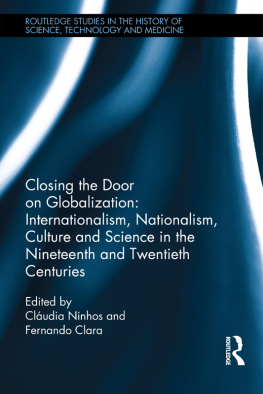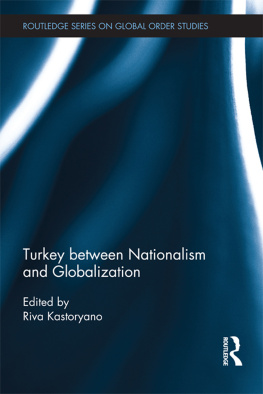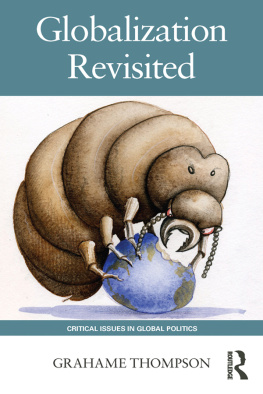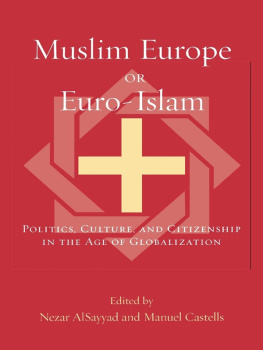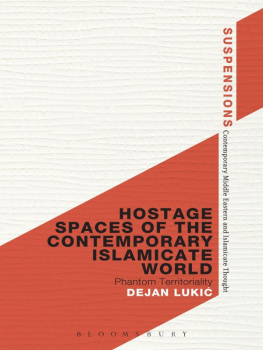First published 2001 by Ashgate Publishing
Reissued 2018 by Routledge
2 Park Square, Milton Park, Abingdon, Oxon 0X14 4RN
711 Third Avenue, New York, NY 10017, USA
Routledge is an imprint of the Taylor & Francis Group, an informa business
All rights reserved. No part of this book may be reprinted or reproduced or utilised in any form or by any electronic, mechanical, or other means, now known or hereafter invented, including photocopying and recording, or in any information storage or retrieval system, without permission in writing from the publishers.
Notice:
Product or corporate names may be trademarks or registered trademarks, and are used only for identification and explanation without intent to infringe.
Publishers Note
The publisher has gone to great lengths to ensure the quality of this reprint but points out that some imperfections in the original copies may be apparent.
Disclaimer
The publisher has made every effort to trace copyright holders and welcomes correspondence from those they have been unable to contact.
A Library of Congress record exists under LC control number: 00134005
ISBN 13: 978-1-138-71641-4 (hbk)
ISBN 13: 978-1-315-19700-5 (ebk)
Given current movements in global culture, technology, mobility, economic integration and regime transformation, what is it that can or does hold a community or political entity together? What are or will be the levels at which these entities will form in the future? Clearly, these questions raise some major issues about the status of the nation-state, which is the main political entity around which the world has been organized, and about nationalism, which has been an important support of many nation-states. From a variety of perspectives, this book examines the cultural politics of nationalism, especially in the context of American culture and European politics where it is undergoing the most intense scrutiny.
The first part of this volume examines the debates on the politics of national identity that surround global information and consumer distribution systems like the Internet The second part offers a number of case studies of European domestic and foreign policy issues directly effected by arguments about cultural identity that have taken shape in the context of an increasingly global environment Of particular interest in this volume is the tension often felt between France and the U.S. on the issue of culture, politics, and nationalism.
Michael Brint begins with an analysis of three different positions taken on issues of identity and technology: Cultural nationalists call for the recognition, protection, and preservation of the nation against global homogeneity, particularly in the guise of U.S. cultural hegemony; Cosmopolitan Humanists advocate the creation of an information society linked by a sophisticated and relatively open communications infrastructure; and post-modern individualists see information technology as both a forum of simulation for the multidimensional play of human identity and a global panopticon of surveillance and control. Drawing from a wide-range of diverse sources, Brint explores the implications of The Politics of Identity and The Culture of Global Technology.
Timothy Baker Shutt in his contribution, Cultural Transmissions: Electronic Orality and the Ergonomics of the Mind analyzes the transition from a predominantly literary and print culture to one that transmits communication orally through the use of information technology. More specifically, Shutt examines the cultural implications of electronic orality and its relation to the biological structures of the mind. He ends with a discussion of English as the language of global orality.
Next, Frank Phillip Coyle examines the architecture of software design in his essay, The sthetics of the Machine. Coyle demonstrates the intricate relation between architecture and the design of software programs. Drawing from the architectural projects of Koolhass and Kurokawa, Coyle offers a unique perspective on culture. Embracing the vocabulary of architecture, he claims that global technology can become an intermediate space that fluidly links disparate and contrasting styles and ways of life. In this respect, the architecture of cyberspace and the sthetics of the machine hold the promise not of creating a homogeneous world, but of constructing standards that symbiotically integrate without eradicating national cultural identities.
Finally, Aida A. Hozic provides a case study of global cultural homogeneity in the film industry. In her essay, The Political Economy of Global Culture A Case Study of the Rim Industry, Hozic uses the entertainment field to explore the evisceration of national identity as an element part of the strategy for developing a global consumer culture.
In Russian Culturalist Arguments Against the Relevance Of Democracy for Russia, Dominique Colas begins the second part of this work. Here case studies of culture, politics, and nationalism are examined. Colas depicts three major types of culturalist arguments currently used to criticize the idea that democracy is the path that Russia can or should have taken given the breakdown of the Party-State. For Solzhenitsyn, what defines Russia is the Orthodox religion. In contrast, Berdiaev emphasizes the Russian roots of communism. Finally, Eurasianism has been in vogue since the end of communism. In the early 1920s the linguist Trubetskoy characterized Eurasia as an area encompassing a single family of languages. The geopolitical Eurasianists of the 1990s are often on the extreme right (they, like the communists, are violently anti-American). In his contribution, Colas argues that the fact that the notion of culture is itself an imported one suggests that the rejection of universalisai in the name of the specificity of Russian or Eurasian culture is founded on a self-destructive paradox.
Jolle Zask raises The Question of Multiculturalism in France. She begins by distinguishing between North American and French positions on multiculturalism. She claims that the core of American and Canadian multiculturalism consists in seeking political representation for a large range of culturally defined minorities. Such an effort acknowledges that a defense of cultural interests, no matter how particular they may be, can represent a common concern of justice. While the American debates have focused on the creation of political devices that bring a liberal order of fairness to a highly politicized cultural pluralism, the fact is that, in France, multiculturalism has led not to the search for a new political unity, but toward a general indictment against alleged risks of dissociation of balkanisation or ghettoisatioa Together with a deeply ingrained fear of the processes of globalization and immigration, the political discourse in France has shown veiy little understanding of what is at stake in multicultural politics.
In the final chapter Reno Lukic takes up the French attitude toward the war in Kosovo. He examines the formidable debates that arose in France during and following the NATO bombings over the Federal Republic of Yugoslavia. Many politicians and intellectuals, from the Left to the Right, denounced the NATO operations in Kosovo as illegal and illegitimate. However, for the most part, Lukic contends, the criticism directed against the Alliance was tainted by virulent anti-Americanism. French political elites who opposed the bombings of the FRY perceived the conflict as another manifestation of the United States readiness to impose its will over Europe. In fact, critics of the NATO intervention seemed to be little interested in the suffering inflicted by the Serbs on a million Kosovars who were deported. Their main concern was, how the war would effect the rank of France in international politics. By adopting this attitude, the opponents of the war in Kosovo became objective allies of the genocidal policy of Milosevic in Kosovo.




